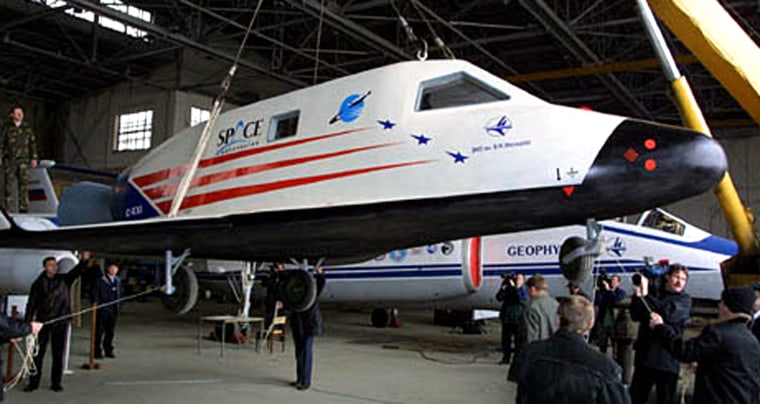The company that helped put three millionaires into orbit has teamed up with Russia's Federal Space Agency and the financial backers of the $10 million Ansari X Prize to develop a new breed of suborbital passenger spaceship.
Thursday's announcement by Virginia-based Space Adventures herald the entry of new international players in the commercial space race — a race that is expected to enter a critical phase in the next year or two.
"We will be the first to fly," Space Adventures spokeswoman Stacey Tearne told MSNBC.com. However, she declined to discuss many of the details behind the venture and its timetable, saying only that "more information will become available" in the days and months ahead.
The arrangement involves two separate contracts: One is between Space Adventures and Prodea, a Texas-based investment firm backed by the same Ansari family that provided the seed money for the $10 million X Prize purse for private suborbital space flight. That prize was won in 2004 by the SpaceShipOne rocket plane, with an insurance company essentially paying off on a bet placed with the Ansaris' money.
The other contract is between Space Adventures and the Russian space agency, for the development of a fleet of "Explorer" spacecraft. Tearne said the Explorer would be based on the C-21 concept produced by Russia's Myasishchev Design Bureau for Space Adventures. A rocket plane would be flown up by a carrier aircraft, then launched to the edge of space — much as SpaceShipOne was.
At altitudes in excess of 62 miles (100 kilometers), up to five people would experience a few minutes of weightlessness aboard the explorer and see the curving Earth beneath the blackness of space.
Who will fly it, and from where?
Tearne said none of the partners in Thursday's deal would actually operate the spacecraft. Instead, the business plan called for Explorers to be sold to operators who would run the flights out of spaceports around the globe. She said the company would be making two more announcements, on Friday and Monday, which would relate to potential operators and/or spaceports.
Although she declined to provide specifics, Space Adventures' president and chief executive officer, Eric Anderson, has said spaceports could be placed in the United States, Singapore, Australia, Dubai or other locations.
This week, the Dubai Press Club sent out invitations to the launch of "an important new landmark project," with Dubai's ruler in attendance. Tearne declined to say whether or not the invitation was linked to Space Adventures' announcements, but the publication TradeArabia reported that a spaceport was being planned in the nearby Arab emirate of Ras Al Khaimah.
Meanwhile, British publications and Singapore's Straits Times reported Friday that another spaceport would be built in Singapore.
In a statement, Anderson and Prodea's Anousheh Ansari said their visions for opening up the space frontier were "completely aligned."
"This joint venture will enable millions of people to realize their dreams of spaceflight," they said.
Competition ahead
But several other ventures are targeting the same market, and appear to be further along the development path. Among the front-runners are British-based Virgin Galactic, which is working with the same Scaled Composites team that built SpaceShipOne; Oklahoma-based Rocketplane Ltd., which is modifying a Learjet for rocket-powered spaceflight; the Canadian-American Planetspace venture, which is trying to get clearance for testing; and XCOR Aerospace, which already has a launch license from the Federal Aviation Administration for a test vehicle.
Rocketplane and Planetspace have targeted 2007 for the start of commercial operations, and Virgin Galactic plans to begin service in 2008 or early 2009. On Thursday, New Mexico legislators approved funding for the construction of a spaceport in Upham, N.M., that would be used by Virgin Galactic.
Tearne declined to compare the other companies' timetables with Space Adventures', but she maintained that "we have the confidence" to say the Explorer will be the "first to fly." She also said Space Adventures would continue to pursue marketing deals with other suborbital companies.
"We want to provide options," she said.
Track record
Without the financial details, it's difficult for outside observers to judge whether the new three-way venture has the technical and financial wherewithal to match the years of work and tens of millions of dollars that others have committed to spacecraft development. But all three of the entities have a successful track record:
- Privately held Space Adventures has arranged for three millionaires to ride on the Federal Space Agency's transports to the international space station: Dennis Tito in 2001, Mark Shuttleworth in 2002 and Greg Olsen last fall. Just before Olsen's launch, Anderson told MSNBC.com that the company was turning a profit and had a list of prospects for future flights. In cooperation with the Federal Space Agency and the Russian rocket company Energia, Space Adventures is offering $100 million tickets for trips around the moon.
- Prodea draws upon the fortunes of Iranian-American entrepreneurs Hamid, Anousheh and Amir Ansari, who made their millions several years ago in the telecommunications industry. The Ansaris played an indispensable role in backing the X Prize, and both Amir and Anousheh told MSNBC.com back in 2004 that they hoped to go into space themselves someday.
- The Federal Space Agency, NASA's counterpart, manages Russia's human spaceflight program and has been looking for commercial deals to supplement government funding. Under the terms of the contract announced Thursday, the agency would oversee and supervise the development of the Explorer.
Anousheh Ansari said she was "completely confident" in the Explorer. "This vehicle is being developed by a group of the most qualified designers and engineers in the world that have the most experience, the highest safety standards and are responsible for the most reliable and longest-serving spacecraft in the world," she said in Thursday's statement.
Anderson was similarly optimistic: "As they have demonstrated in many past efforts, the Russian space agency's commitment to this new and pioneering project will expedite its eventual success."
